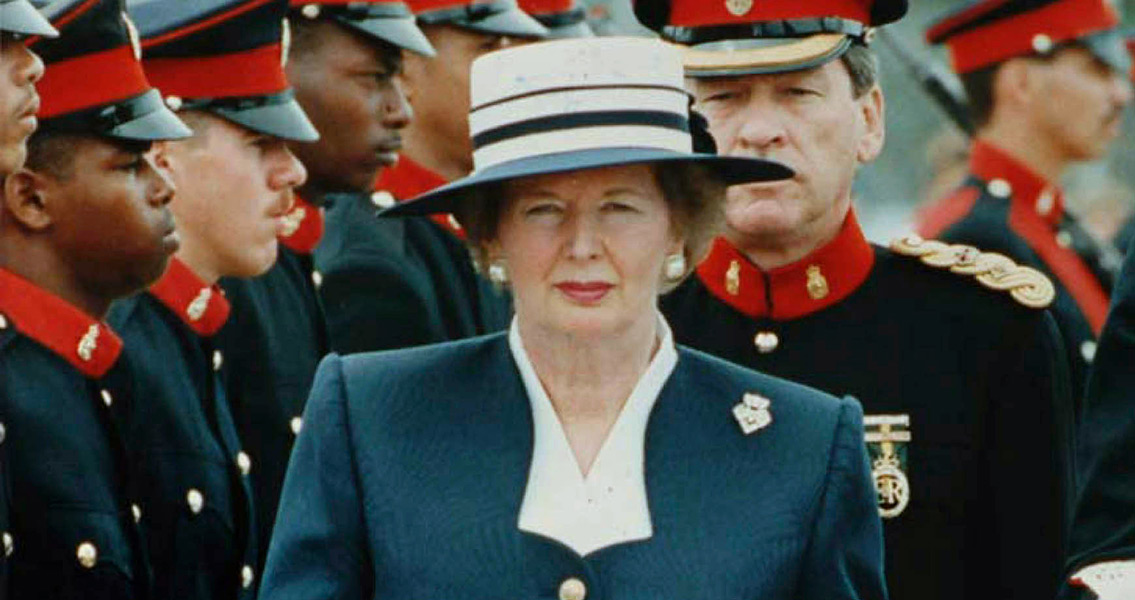<![CDATA[On 28th November, 1990, Margaret Thatcher was replaced as British Prime Minister by John Major. It marked the culmination of a remarkable series of events which had seen elements of Thatcher's own party turn against her despite three successive electoral victories. Thatcher, born in 1925, remains one of Britain's most controversial politicians. She first entered politics in 1959, when she was elected the Conservative MP for Finchley, and swiftly rose through the ranks of the Tory party in the 1960s, becoming Secretary of State for Education and Science in Edward Heath's government in 1967. With the Conservatives returning to opposition in 1974, Thatcher's rise was cemented when she was elected the party's new leader. Her aggressive policies quickly came to the fore, as she led the party in a drastic shift further right as it set out its clear opposition to the left-wing tendencies which had defined British politics in the Post-War years. A key element of the party's campaign in opposition was a stern criticism of the Labour party's handling of the industrial strikes of 1978 and 1979. In 1979, following a vote of no confidence in Labour Prime Minister Jim Callaghan, the Conservative Party swept to power and Thatcher was sworn in as Britain's first woman Prime Minister. As promised while in opposition, Thatcher quickly set about leading a program of drastic, right-wing reforms. Mass privatisation took place in Britain's utilities and state owned industries, government spending was significantly curtailed, and the powers of trade unions were dismantled. Deeply unpopular in some elements in society, and heralded as Britain's saviour in others, Thatcher's eleven year stint as Prime Minister was undoubtedly hugely significant, laying the economic, social and political foundations for modern Britain. It was also a leadership which was massively eventful in the short term, witnessing the Falklands' War and the dramatic conflict between British authorities and the coal miners strikes. A number of factors in Thatcher's third term as Prime Minister ultimately saw her popularity deteriorate within her own party, and triggered the chain of events which ended in her resignation. Despite her success in dealing with the miners' strikes, Thatcher's Poll Tax proved a step too far. Sometimes referred to as the Community Charge, the new legislation placed a tax on every adult within a household. The Poll Tax was viewed as a deliberate attempt to shift the tax burden from the wealthy to the poor, as it failed to take into consideration individual wealth or the value of a property. Combined with the fact that it disproportionately burdened the poorer in society, who tended to live in smaller houses with more adults, the tax triggered mass riots around the country and made Thatcher's Tory colleagues increasingly nervous about the party's future election prospects. At the same time, despite supporting Britain's into the European Community in 1973, Thatcher became increasingly Euroskeptic in the final years of her term in office. In the Conservative party, and in Britain in general, this attitude was viewed as needlessly reactionary, potentially holding back the country's economic development. Conservative party leadership elections in early November 1990 showed just how unpopular Thatcher had become in the party, with the incumbent Prime Minister failing to win a majority of the vote. For many, Thatcher's failure in the election was the result of a conspiracy by Michael Heseltine, who had been campaigning against Thatcher since the late 1980s. On 22nd November, 1990, Thatcher announced her decision to resign as the party became increasingly divided between Thatcherites and Heseltine's supporters, starting a leadership competition between Heseltine, John Major and Douglas Hurd. Six days later, on 28th November, John Major was announced the new party leader and the new Prime Minister, and Thatcher offically stepped down. Whatever one's views on Thatcher, it undoubtedly marked the end of one of the most important eras in the history of British politics.]]>
Thatcher Leaves Number Ten
